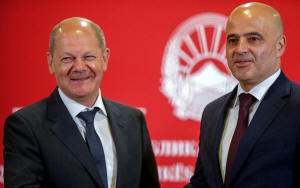Scholz calls for EU to open accession talks with North Macedonia and
Albania
 Send a link to a friend
Send a link to a friend
 [June 11, 2022]
SKOPJE (Reuters) - The European Union
should kick off accession talks with North Macedonia and Albania to
finally fulfil its pledge to integrate the Western Balkans, German
Chancellor Olaf Scholz said on Saturday on the second day of a tour to
the region. [June 11, 2022]
SKOPJE (Reuters) - The European Union
should kick off accession talks with North Macedonia and Albania to
finally fulfil its pledge to integrate the Western Balkans, German
Chancellor Olaf Scholz said on Saturday on the second day of a tour to
the region.
Speaking in Skopje, Scholz said that Russia's invasion of Ukraine made
it important for Europe to stand together and he praised North
Macedonia's support of sanctions on the Kremlin.
"It's very important to bring a new dynamic into this process," Scholz
said in a news conference with North Macedonian Prime Minister Dimitar
Kovacevski.
"I will advocate that the next steps happen."

Supporters of the EU accession of Albania and the countries that emerged
from the break-up of Yugoslavia and the ethnic wars of the 1990s say it
will ease regional tensions, counter growing Russian and Chinese
influence and raise living standards.
Four - Serbia, Montenegro, North Macedonia and Albania - already have
candidate status although the latter two have not started accession
talks. The overall process has stalled in recent years amid doubts about
the wisdom of further EU enlargement.
[to top of second column]
|

German Chancellor Olaf Scholz and North Macedonian Prime Minister
Dimitar Kovacevski react as they attend a news conference in Skopje,
North Macedonia June 11, 2022. REUTERS/Ognen Teofilovski

Kovacevski underscored the "many difficult reforms"
North Macedonia had undertaken in order to join the 27-member bloc,
including changing its name to comply with Greek objections.
The current main obstacle is a dispute with Bulgaria over history
and language.
Scholz, who has fashioned himself as a mediator during his Western
Balkans trip, is set to travel onwards to Sofia on Saturday where he
will hold talks with Bulgarian Prime Minister Kiril Petkov.
The chancellor has made the Western Balkans' EU accession, in order
to ease growing regional tensions and counter Russian and Chinese
influence, a foreign policy priority.
On Friday, he visited Serbia and Kosovo, which declared independence
from Belgrade in 2008, where he urged the leaders to reach an
agreement normalising relations.
(Reporting by Sarah Marsh in Skopje and Ivana Sekularac in Belgrade;
additional Reporting by Tom Sims in Frankfurt; editing by Jason
Neely)
[© 2022 Thomson Reuters. All rights
reserved.]
This material may not be published,
broadcast, rewritten or redistributed.
Thompson Reuters is solely responsible for this content. |